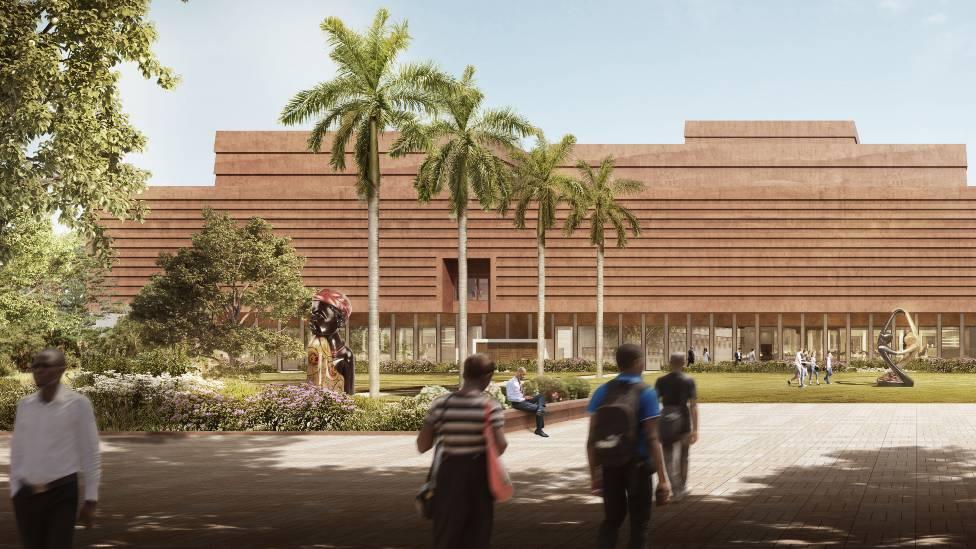Humboldt Forum: Berlin museum opens despite criticism over looted art
- Published

The museum's opening was being held online due to the coronavirus pandemic
The opening of a new museum in a reconstructed royal palace in Berlin has been overshadowed by debate over looted art and colonialism.
The Humboldt Forum, which cost more than €677m ($824m; £610m), was opening on Wednesday.
There has been widespread criticism over the museum housing nearly 20,000 artefacts from Africa, Asia and Oceania, mostly former colonies.
But one of the most controversial exhibits won't be seen until next year.
The museum plans to house Benin Bronzes, valuable sculptures looted from Nigeria by British soldiers in 1897.
The Nigerian government has called for them to be returned.
The opening of the museum was being held online because of the coronavirus pandemic.
The new building's ornate baroque facade is a reconstruction of Frederick the Great's palace, which stood on the site until it was demolished by the East German government in 1950 after being damaged by bombing in the war.
The communist authorities replaced it with the Palace of the Republic, which housed the East German parliament and a cultural and leisure centre.
This building was in turn demolished to make way for the reconstruction.
The new Humboldt Forum is supposed to showcase global culture and become a symbol of tolerance and diversity in reunified Germany, the BBC's Damien McGuinness reports.
The museum was once described as "Europe's largest cultural project" by Monika Grütters, German minister of culture.
Berlin Mayor Michael Mueller said on Wednesday that the Humboldt Forum would be "a place to reflect on our history and our place in the world".

Most Benin Bronzes (seen here in London in 2013) are in Western museums or private collections
Part of the museum will be dedicated to the collections of Berlin's Ethnological Museum and the Museum of Asian Art.
But it's the inclusion of Benin Bronzes that have caused the most controversy.
The cultural treasures - thousands of brass, bronze and ivory sculptures and carvings - were taken from the royal palace in Benin City in what is now Edo State, in southern Nigeria. Most are in Western museums and private collections.
Some 180 are due to be exhibited in the Humboldt Forum next year.
The Nigerian ambassador to Germany, Yusuf Tuggar, has called for the return of the artefacts.
He said he had penned "a formal letter" to Ms Grütters and Chancellor Angela Merkel, but had received no reply.
A spokeswoman for the Prussian Cultural Heritage Foundation, which manages Berlin's public museums, said "no official request for repatriation" had been received.
The ancient trade of Benin bronzes lives on
Historians and anti-racism activists in Germany say the museum needs to do more to explain where these treasures come from and how they got to Europe.
"A lot of these objects were stolen, robbed, looted," Mnyaka Sururu Mboro, a Tanzanian activist and founder of the NGO Berlin Postkolonial, told the Financial Times. , external
"Some were used in rituals and prayers - it is like taking the altar from a Catholic church."
In 2017, French art historian Bénédicte Savoy, an expert in looted art, stepped down from the international expert committee of the Humboldt Forum as she felt research was not happening fast enough.
"I want to know how much blood drips from a work of art," she told the Süddeutsche Zeitung website.
"Without this research, no Humboldt Forum and no ethnological museum should be opened today."
The Humboldt Forum is one of many museums struggling to justify the legitimacy of its collection.
The British Museum in London, which has some 950 Benin Bronzes, has come under particular criticism for its refusal to give them back.
- Published12 September 2020

- Published13 November 2020
